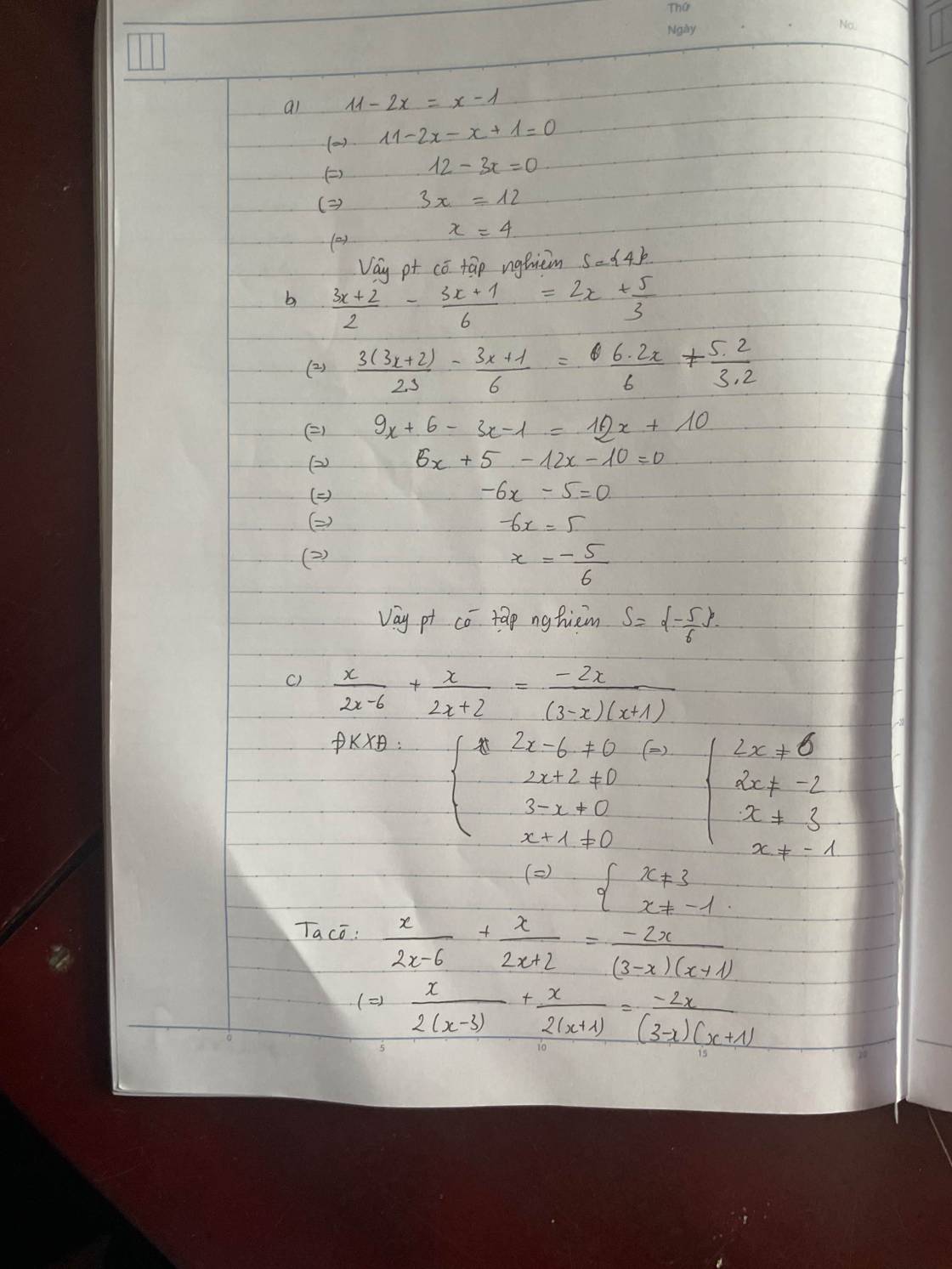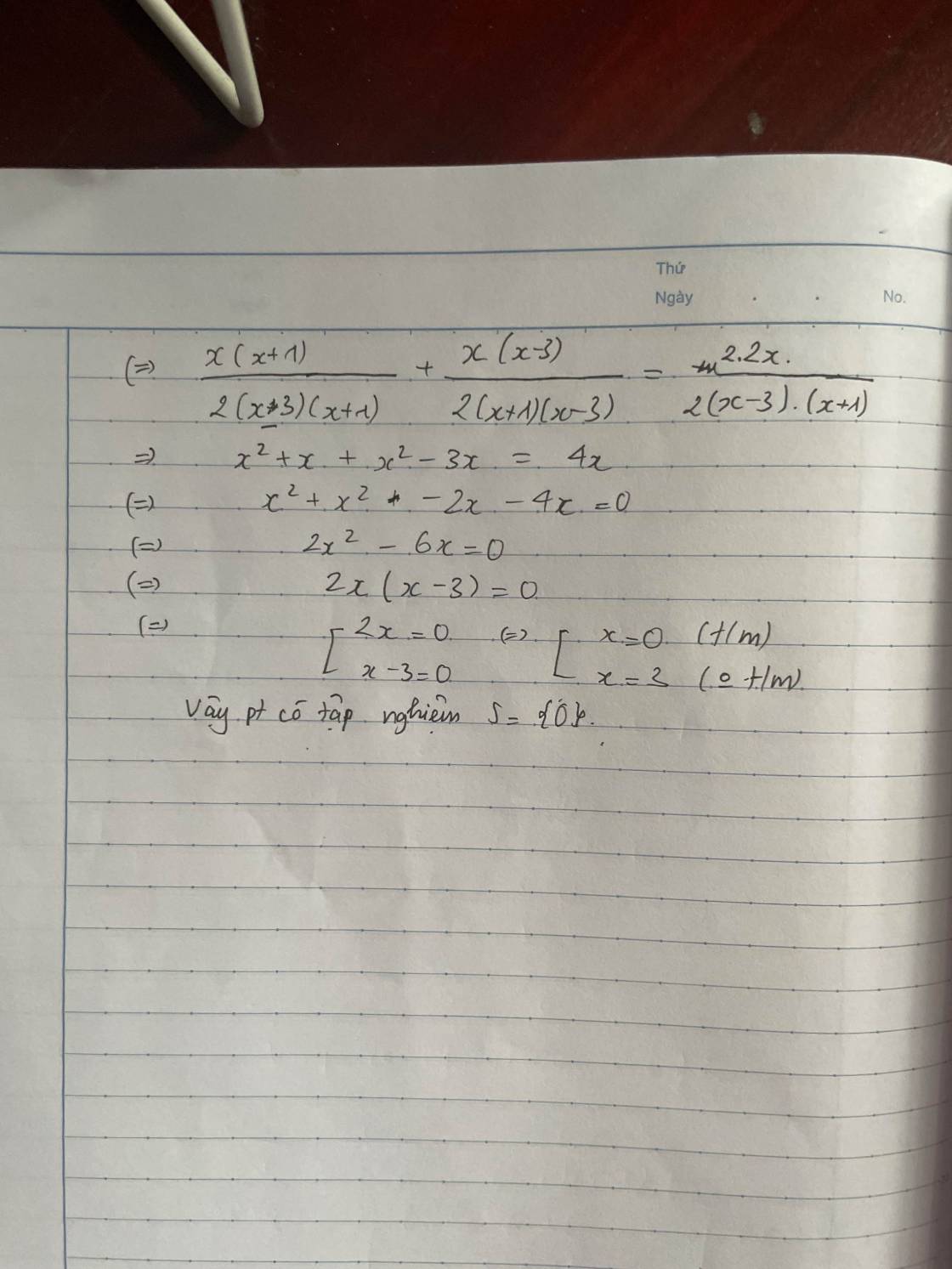giải |2x+1|-|3x-5|=6
Hãy nhập câu hỏi của bạn vào đây, nếu là tài khoản VIP, bạn sẽ được ưu tiên trả lời.


a) Ta có: \(\left(2x-3\right)^2=\left(2x-3\right)\left(x+1\right)\)
\(\Leftrightarrow\left(2x-3\right)^2-\left(2x-3\right)\left(x+1\right)=0\)
\(\Leftrightarrow\left(2x-3\right)\left(2x-3-x-1\right)=0\)
\(\Leftrightarrow\left(2x-3\right)\left(x-4\right)=0\)
\(\Leftrightarrow\left[{}\begin{matrix}2x-3=0\\x-4=0\end{matrix}\right.\Leftrightarrow\left[{}\begin{matrix}2x=3\\x=4\end{matrix}\right.\Leftrightarrow\left[{}\begin{matrix}x=\dfrac{3}{2}\\x=4\end{matrix}\right.\)
Vậy: \(S=\left\{\dfrac{3}{2};4\right\}\)
b) Ta có: \(x\left(2x-9\right)=3x\left(x-5\right)\)
\(\Leftrightarrow x\left(2x-9\right)-3x\left(x-5\right)=0\)
\(\Leftrightarrow x\left(2x-9\right)-x\left(3x-15\right)=0\)
\(\Leftrightarrow x\left(2x-9-3x+15\right)=0\)
\(\Leftrightarrow x\left(6-x\right)=0\)
\(\Leftrightarrow\left[{}\begin{matrix}x=0\\6-x=0\end{matrix}\right.\Leftrightarrow\left[{}\begin{matrix}x=0\\x=6\end{matrix}\right.\)
Vậy: S={0;6}
c) Ta có: \(3x-15=2x\left(x-5\right)\)
\(\Leftrightarrow3\left(x-5\right)-2x\left(x-5\right)=0\)
\(\Leftrightarrow\left(x-5\right)\left(3-2x\right)=0\)
\(\Leftrightarrow\left[{}\begin{matrix}x-5=0\\3-2x=0\end{matrix}\right.\Leftrightarrow\left[{}\begin{matrix}x=5\\2x=3\end{matrix}\right.\Leftrightarrow\left[{}\begin{matrix}x=5\\x=\dfrac{3}{2}\end{matrix}\right.\)
Vậy: \(S=\left\{5;\dfrac{3}{2}\right\}\)
d) Ta có: \(\dfrac{5-x}{2}=\dfrac{3x-4}{6}\)
\(\Leftrightarrow6\left(5-x\right)=2\left(3x-4\right)\)
\(\Leftrightarrow30-6x=6x-8\)
\(\Leftrightarrow30-6x-6x+8=0\)
\(\Leftrightarrow-12x+38=0\)
\(\Leftrightarrow-12x=-38\)
\(\Leftrightarrow x=\dfrac{19}{6}\)
Vậy: \(S=\left\{\dfrac{19}{6}\right\}\)
e) Ta có: \(\dfrac{3x+2}{2}-\dfrac{3x+1}{6}=2x+\dfrac{5}{3}\)
\(\Leftrightarrow\dfrac{3\left(3x+2\right)}{6}-\dfrac{3x+1}{6}=\dfrac{12x}{6}+\dfrac{10}{6}\)
\(\Leftrightarrow6x+4-3x-1=12x+10\)
\(\Leftrightarrow3x+3-12x-10=0\)
\(\Leftrightarrow-9x-7=0\)
\(\Leftrightarrow-9x=7\)
\(\Leftrightarrow x=-\dfrac{7}{9}\)
Vậy: \(S=\left\{-\dfrac{7}{9}\right\}\)

a: =>-3x=-12
=>x=4
b: =>3(3x+2)-3x-1=12x+10
=>9x+6-3x-1=12x+10
=>12x+10=6x+5
=>6x=-5
=>x=-5/6
c: =>x(x+1)+x(x-3)=4x
=>x^2+x+x^2-3x-4x=0
=>2x^2-6x=0
=>2x(x-3)=0
=>x=3(loại) hoặc x=0(nhận)

a: =>9x^2+6x+1-6(2x^2-13x+21)=0
=>9x^2+6x+1-12x^2+78x-126=0
=>-3x^2+84x-125=0
=>\(x\in\left\{26.42;1.58\right\}\)
b: =>(3x+1)[(2x-5)^2-(x-3)^2]=0
=>(3x+1)(2x-5-x+3)(2x-5+x-3)=0
=>(3x+1)(x-2)(3x-8)=0
=>\(x\in\left\{-\dfrac{1}{3};2;\dfrac{8}{3}\right\}\)
c; =>(x+5)(0,75x-3+1,25x)=0
=>(x+5)(2x-3)=0
=>x=3/2 hoặc x=-5

Bài 1:
a.
$(4x^2+4x+1)-x^2=0$
$\Leftrightarrow (2x+1)^2-x^2=0$
$\Leftrightarrow (2x+1-x)(2x+1+x)=0$
$\Leftrightarrow (x+1)(3x+1)=0$
$\Rightarrow x+1=0$ hoặc $3x+1=0$
$\Rightarrow x=-1$ hoặc $x=-\frac{1}{3}$
b.
$x^2-2x+1=4$
$\Leftrightarrow (x-1)^2=2^2$
$\Leftrightarrow (x-1)^2-2^2=0$
$\Leftrightarrow (x-1-2)(x-1+2)=0$
$\Leftrightarrow (x-3)(x+1)=0$
$\Leftrightarrow x-3=0$ hoặc $x+1=0$
$\Leftrightarrow x=3$ hoặc $x=-1$
c.
$x^2-5x+6=0$
$\Leftrightarrow (x^2-2x)-(3x-6)=0$
$\Leftrightarrow x(x-2)-3(x-2)=0$
$\Leftrightarrow (x-2)(x-3)=0$
$\Leftrightarrow x-2=0$ hoặc $x-3=0$
$\Leftrightarrow x=2$ hoặc $x=3$
2c.
ĐKXĐ: $x\neq 0$
PT $\Leftrightarrow x-\frac{6}{x}=x+\frac{3}{2}$
$\Leftrightarrow -\frac{6}{x}=\frac{3}{2}$
$\Leftrightarrow x=-4$ (tm)
2d.
ĐKXĐ: $x\neq 2$
PT $\Leftrightarrow \frac{1+3(x-2)}{x-2}=\frac{3-x}{x-2}$
$\Leftrightarrow \frac{3x-5}{x-2}=\frac{3-x}{x-2}$
$\Rightarrow 3x-5=3-x$
$\Leftrightarrow 4x=8$
$\Leftrightarrow x=2$ (không tm)
Vậy pt vô nghiệm.

1: Ta có: \(2x\left(x+3\right)-6\left(x-3\right)=0\)
\(\Leftrightarrow2x^2+6x-6x+18=0\)
\(\Leftrightarrow2x^2+18=0\left(loại\right)\)
2: Ta có: \(2x^2\left(2x+3\right)+\left(2x+3\right)=0\)
\(\Leftrightarrow2x+3=0\)
hay \(x=-\dfrac{3}{2}\)
3: Ta có: \(\left(x-2\right)\left(x+1\right)-4x\left(x-2\right)=0\)
\(\Leftrightarrow\left(x-2\right)\left(1-3x\right)=0\)
\(\Leftrightarrow\left[{}\begin{matrix}x=2\\x=\dfrac{1}{3}\end{matrix}\right.\)
4: Ta có: \(2x\left(x-5\right)-3x+15=0\)
\(\Leftrightarrow\left(x-5\right)\left(2x-3\right)=0\)
\(\Leftrightarrow\left[{}\begin{matrix}x=5\\x=\dfrac{3}{2}\end{matrix}\right.\)
5: Ta có: \(3x\left(x+4\right)-2x-8=0\)
\(\Leftrightarrow\left(x+4\right)\left(3x-2\right)=0\)
\(\Leftrightarrow\left[{}\begin{matrix}x=-4\\x=\dfrac{2}{3}\end{matrix}\right.\)
6: Ta có: \(x^2\left(2x-6\right)+2x-6=0\)
\(\Leftrightarrow2x-6=0\)
hay x=3

Bài 1.
\( a)\dfrac{{4x - 8}}{{2{x^2} + 1}} = 0 (x \in \mathbb{R})\\ \Leftrightarrow 4x - 8 = 0\\ \Leftrightarrow 4x = 8\\ \Leftrightarrow x = 2\left( {tm} \right)\\ b)\dfrac{{{x^2} - x - 6}}{{x - 3}} = 0\left( {x \ne 3} \right)\\ \Leftrightarrow \dfrac{{{x^2} + 2x - 3x - 6}}{{x - 3}} = 0\\ \Leftrightarrow \dfrac{{x\left( {x + 2} \right) - 3\left( {x + 2} \right)}}{{x - 3}} = 0\\ \Leftrightarrow \dfrac{{\left( {x + 2} \right)\left( {x - 3} \right)}}{{x - 3}} = 0\\ \Leftrightarrow x - 2 = 0\\ \Leftrightarrow x = 2\left( {tm} \right) \)
Bài 2.
\(c)\dfrac{{x + 5}}{{3x - 6}} - \dfrac{1}{2} = \dfrac{{2x - 3}}{{2x - 4}}\)
ĐK: \(x\ne2\)
\( Pt \Leftrightarrow \dfrac{{x + 5}}{{3x - 6}} - \dfrac{{2x - 3}}{{2x - 4}} = \dfrac{1}{2}\\ \Leftrightarrow \dfrac{{x + 5}}{{3\left( {x - 2} \right)}} - \dfrac{{2x - 3}}{{2\left( {x - 2} \right)}} = \dfrac{1}{2}\\ \Leftrightarrow \dfrac{{2\left( {x + 5} \right) - 3\left( {2x - 3} \right)}}{{6\left( {x - 2} \right)}} = \dfrac{1}{2}\\ \Leftrightarrow \dfrac{{ - 4x + 19}}{{6\left( {x - 2} \right)}} = \dfrac{1}{2}\\ \Leftrightarrow 2\left( { - 4x + 19} \right) = 6\left( {x - 2} \right)\\ \Leftrightarrow - 8x + 38 = 6x - 12\\ \Leftrightarrow - 14x = - 50\\ \Leftrightarrow x = \dfrac{{27}}{5}\left( {tm} \right)\\ d)\dfrac{{12}}{{1 - 9{x^2}}} = \dfrac{{1 - 3x}}{{1 + 3x}} - \dfrac{{1 + 3x}}{{1 - 3x}} \)
ĐK: \(x \ne -\dfrac{1}{3};x \ne \dfrac{1}{3}\)
\( Pt \Leftrightarrow \dfrac{{12}}{{1 - 9{x^2}}} - \dfrac{{1 - 3x}}{{1 + 3x}} - \dfrac{{1 + 3x}}{{1 - 3x}} = 0\\ \Leftrightarrow \dfrac{{12}}{{\left( {1 - 3x} \right)\left( {1 + 3x} \right)}} - \dfrac{{1 - 3x}}{{1 + 3x}} - \dfrac{{1 + 3x}}{{1 - 3x}} = 0\\ \Leftrightarrow \dfrac{{12 - {{\left( {1 - 3x} \right)}^2} - {{\left( {1 + 3x} \right)}^2}}}{{\left( {1 - 3x} \right)\left( {1 + 3x} \right)}} = 0\\ \Leftrightarrow \dfrac{{12 + 12x}}{{\left( {1 - 3x} \right)\left( {1 + 3x} \right)}} = 0\\ \Leftrightarrow 12 + 12x = 0\\ \Leftrightarrow 12x = - 12\\ \Leftrightarrow x = - 1\left( {tm} \right) \)

a) Ta có: \(3x-1=0\)
\(\Leftrightarrow3x=1\)
\(\Leftrightarrow x=\dfrac{1}{3}\)
Vậy: \(S=\left\{\dfrac{1}{3}\right\}\)
b) Ta có: \(5x-2=x+4\)
\(\Leftrightarrow5x-x=4+2\)
\(\Leftrightarrow4x=6\)
\(\Leftrightarrow x=\dfrac{3}{2}\)
Vậy: \(S=\left\{\dfrac{3}{2}\right\}\)

